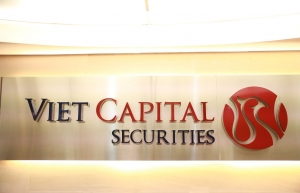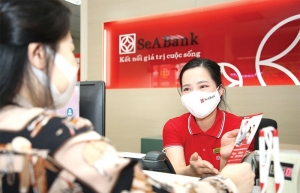Loosened credit may not be enough for real estate capital
With the additional credit growth of 4 per cent, Sacombank’s total credit growth limit for the whole year increased to 11 per cent. Calculating its total loan balance of more than $17.3 million at the end of the second quarter of 2022, the bank has room to grow by more than $652 million by the end of this year.
 |
| Loosened credit may not be enough for real estate capital |
CEO Nguyen Duc Thach Diem said that the bank will give additional credit priority to production, business, areas according to the policy of the government, and support for individual customers to start and run the business effectively.
For real estate, Sacombank continues to limit lending or only disburse contracts that have been committed to providing credit before.
Vietcombank was also approved to increase its credit balance by 2.7 per cent up to December. By the end of August, Vietcombank has grown credit by 14.7 per cent compared to the beginning of the year, so the maximum new loan space is about $1.39 billion for the remaining four months of the year. Thus, for the whole of 2022, the bank has increased credit by 17.7 per cent.
“After being allowed by the SBV to increase the maximum credit balance, Vietcombank will continue to control credit growth into essential industries of the economy and priority areas of the government. At the same time, the bank will control liquidity and credit risks, ensuring a low bad debt ratio and maintaining the interest rates for capital mobilisation and lending at reasonable levels,” a representative of Vietcombank said.
Meanwhile, according to Han Ngoc Vu, CEO of VIB, with the additional credit room of 3 per cent, VIB will use this additional resource to its strengths of lending to consumers as well as small- and medium-sized enterprises.
Although banks have been extended credit room by the SBV, the remaining lending room in the last four months of the year is still modest.
Standing Deputy Governor of the SBV Dao Minh Tu said that by the end of August, credit growth reached 9.91 per cent, much higher than the same period two years ago.
Previously, according to data released by the SBV, as of August 15 the credit of the whole economy increased by 9.62 per cent. Thus, from July to mid-August, credit only increased by 0.27 per cent, while in the first half of this year, the average increase was nearly 1.6 per cent per month.
Analysts from Rong Viet Securities Corporation (VDSC) also said that the real estate industry will still face difficulties in the short term.
“The possibility that input and output interest rates will continue to increase and the stricter control of real estate credit activities of banks will greatly affect the liquidity of projects, cash flows, and profits of real estate enterprises in 2022-2023,” read a VDSC report.
The policy of controlling credit flowing into the real estate market is also said to be the main reason for pushing up home loan interest rates. According to the SBV, by the end of June the total outstanding credit in the real estate sector increased by 14 per cent compared to the end of 2021, accounting for 20 per cent of the total credit balance of the whole system.
The SBV said that excessively promoting bank credit into real estate will create significant risk impacts on the safety of the system and the economy in general as credit for real estate usually is based on the long term (about 95 per cent of real estate credit balances are 10-30 years in length), while the mobilisation source of savings is mainly short term.
| By the end of June 2022, credit for business real estate increased by 8.19 per cent, accounting for 33 per cent of outstanding loans in this sector. Of those, real estate credit for self-use increased by 17.2 per cent, accounting for 67 per cent of outstanding loans in this sector. Bad debt in the real estate sector is about $1.58 billion, an increase of 5 per cent compared to the end of 2021. The bad debt ratio is 1.54 per cent, compared to 1.67 per cent reported in 2021. |
 | FiinRatings assigns Viet Capital Securities ICR rating of A- FiinRatings has announced that it has assigned a first-time, long-term issuer credit rating of A- to Viet Capital Securities JSC (VCI) with an outlook of Stable. |
 | Ratings upgrades auger well for long-term progress Moody’s Investors Service has upgraded the long-term local and foreign currency deposit and issuer ratings of eight Vietnamese banks, following its upgrade of the country’s sovereign rating earlier this month. |
 | Financial titans seeking to prompt credit card adoption Despite several competitive advantages, the number of domestic credit card holders in Vietnam is still relatively low, but some financial institutions are attempting to break into this budding market. |
What the stars mean:
★ Poor ★ ★ Promising ★★★ Good ★★★★ Very good ★★★★★ Exceptional
Related Contents
Latest News
More News
- Vietnam breaks into Top 10 countries and regions for LEED outside the US (February 05, 2026 | 17:56)
- Fairmont opens first Vietnam property in Hanoi (February 04, 2026 | 16:09)
- Real estate investment trusts pivotal for long-term success (February 02, 2026 | 11:09)
- Dong Nai experiences shifting expectations and new industrial cycle (January 28, 2026 | 09:00)
- An Phat 5 Industrial Park targets ESG-driven investors in Hai Phong (January 26, 2026 | 08:30)
- Decree opens incentives for green urban development (January 24, 2026 | 11:18)
- Public investment is reshaping real estate’s role in Vietnam (January 21, 2026 | 10:04)
- Ho Chi Minh City seeks investor to revive Binh Quoi–Thanh Da project (January 19, 2026 | 11:58)
- Sun Group launches construction of Rach Chiec sports complex (January 16, 2026 | 16:17)
- CEO Group breaks ground on first industrial park in Haiphong Free Trade Zone (January 15, 2026 | 15:47)

 Tag:
Tag:




















 Mobile Version
Mobile Version